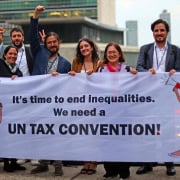|
Getting your Trinity Audio player ready...
|
For those who wonder why such a fuss is made about illicit financial flows in the form of tax abuse, here is the reason – countries around the world are losing US$492-billion in tax a year because multinational corporations and wealthy individuals are able to use tax havens to avoid or underpay tax.
Nearly half a trillion dollars – an unimaginable sum of money, derived from cross-border tax abuse by multinational companies (US$347.6 billion) and by individuals hiding their undeclared assets offshore (US$144.8 billion), says the Tax Justice Network (TJN), whose 2024 State of Tax Justice report was released towards the end of 2024. The annual publication looks at how much money countries lose to global tax abuse.
Currently global tax rules are controlled by the Organisation for Economic Co-operation and Development (OECD). However, this situation is fundamentally unfair to the countries of the Global South because, says TJN, the OECD is “mandated only to represent the interests of 38 advanced economies which make up its membership”. Furthermore, the UN Secretary General’s 2023 report on the very issue recognised that “existing international and multilateral arrangements … do not satisfy the main elements for fully inclusive and more effective international tax cooperation.“
Negotiations are currently in progress at the UN for the establishment of a new framework tax convention which will fall under the administration of that intergovernmental organisation. But while developing regions are fighting the good fight, a tight group of eight developed OECD countries are pushing back in an attempt to keep the status quo and protect their own interests. Australia, Canada, Israel, Japan, New Zealand, South Korea, the UK, and the US are fiercely opposed to proposed reform of the global tax rules, and no wonder – between them they enable the loss of some 43% of the nearly $500-billion. They would, therefore, be the biggest losers should the proposed control of global taxation move from the OECD – the “rich countries’ club”, says the TJN – to the UN, who would administer it more equitably.
These eight countries who voted against the terms of reference for the new UN convention are home to just 8% of the world’s people, yet they are collectively responsible for a staggering 66% of global tax losses due to offshore wealth. They are also collectively responsible for 34% of global tax losses due to corporate tax abuse, adds TJN.
But these countries are also among those who lose inordinate amounts of money to abuses, collectively bleeding $177-billion in 2024. It’s a lose-lose situation that TJN chief executive Alex Cobham cannot understand.
“The UK and the US are both among the biggest enablers and the biggest losers … their people consistently demand an end to tax abuse, so it’s absurd that the US and UK are seeking to preserve it. It’s perhaps harder to understand why the other handful of blockers, like Australia, Canada, and Japan, who don’t play anything like such a damaging role, would be willing to go along with this.”
UN tax convention a necessity to bring fairness back into taxation
Multinationals are shifting more profit into tax havens and underpaying more on tax, says TJN, proving the failure of the OECD’s tax reform attempts. Tax cuts are no incentive for better behaviour – on the contrary, they spur multinationals on to even greater crimes. “Asked to pay less tax, multinational corporations cheated more.”
The negotiation of a UN tax convention is therefore widely seen as “the biggest shakeup in history to the global tax system, and previously reported as the world’s best chance to avert losing nearly US$5-trillion to tax havens over the next decade”. This figure was posited in the 2023 edition of the State of Tax Justice report.
Among the eight OECD countries, most of the responsibility for enabling global tax losses lies with the UK and its dependencies like the British Virgin Islands, Cayman and Bermuda, says TJN. The report shows that these territories are responsible for over a quarter of all countries’ tax losses (26%), costing countries US$129-billion a year. The US is responsible for 7.6%, costing countries US$38-billion a year, while Canada is responsible for 6.3%, costing countries US$31-billion a year.
The remaining five countries each cause 1% or less in tax losses for other countries.
For each US$1 the eight countries collected in tax from enabling global tax abuse, says TJN, the rest of the world lost US$16 in tax.
“The hurtful eight voted for a world where we all keep losing half a trillion a year to tax-cheating multinational corporations and the super-rich,” says Cobham.








